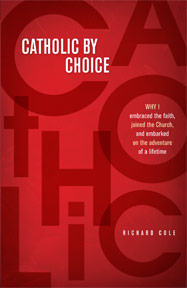I think of what I’ve written over the years as a sort of spiritual paper trail, most of which was finished before I believed in God or much of anything else. God was with me all along, of course. Where is He not? When is He not? Creativity is spirited work, and aside from little spurts and bubbles, inspiration can only be encouraged, not engineered. I also think that God signs His work, and we can see that signature throughout creation, including what we make along with and through Him ― books, businesses, software, children, all sorts of things. As Paula D’Arcy says, “God comes to us disguised as our lives.”
–
My Wife Believes in Reincarnation
I’ve never thought about money so much
since moving to New York. Brooding in silence,
I watch how the Chinese goldfish follow
their lucky noses back and forth. We need
to build up equity. Each month, half our income
disappears for rent, but with interest rates
and nothing in the bank, what can we do?
My wife reads a book on “spiritual midwifery,”
newborns blinking at the camera, wrinkled, astonished.
The goldfish stare back, mild and brainless,
happy enough in their temperate world.
In the crowded park on summer afternoons, we admire
the children of others: toddlers squatting in the sand
and ignoring the giant, assuming faces above them.
Everything we’ve tried to create together
has failed, except our life together.
Our arms are empty. We must have faith.
My wife believes in reincarnation. In the nature shows
on television, galaxies of bright spores float
through darkness. I kiss her shoulders.
“That’s how I think of our souls,” she tells me.
“Millions ascending, life after life.”
I turn off the set. She adds, “This child
is simply waiting for its own sweet time.”
After love, I leave her sleeping and take
my shower, washing off her lotions and oils,
the fragrances, our sweat. I towel myself dry, feeling
the warm air on my body from the open window.
Ferns tremble in the breeze moving
through the dark apartment. Someone calls
from the street. Tiny souls, the millions streaming
lavishly through space, through time,
simple and perfect, like snow.

